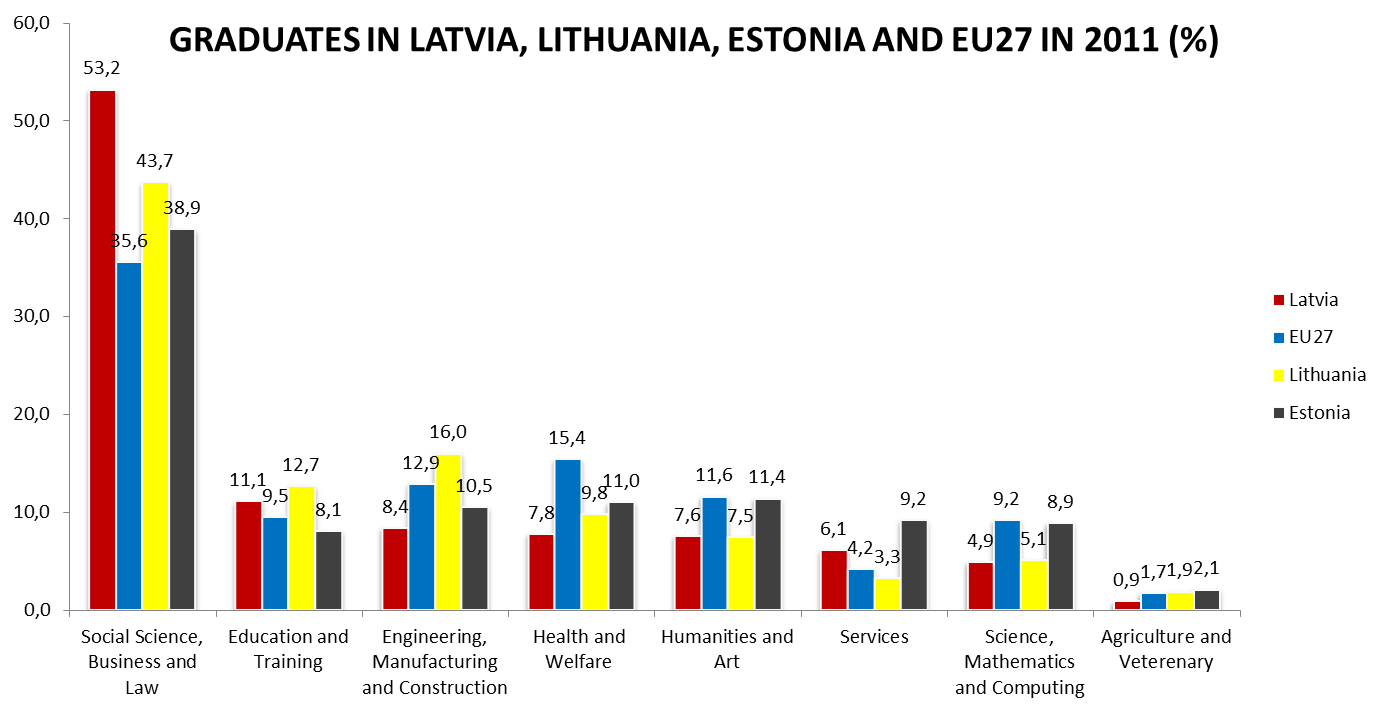Will Latvia prepare the required number of STEMs graduates?
It has been acknowledged that the supply of STEM skills on European level is not sufficient due to:
- Continuing low achievement in science at schools;
- Declining numbers of STEM graduates;
- Ageing of current STEM professionals;
- Some negative perceptions about STEM related careers;
- Increasing global competition for STEM graduates.[1]
On 3 December this year OECD published the results of the latest International PISA (Programme for International Student Assessment) survey. The total of 34 OECD countries and 31 partner countries, including Latvia, were represented, including 6,896 15-year-olds from 270 Latvian schools. Taking into account the linkage between learning outcomes in sciences and mathematics and the potential choice of the study field at a later stage of life, the achievements of Latvian schoolchildren in PISA tests demonstrate a positive trend. It shall be admitted, however, that the results of Latvian schoolchildren are not as good as those, for instance, of the neighbouring Estonia.
At tertiary level, if we compare the proportion of graduates in Latvia, the neighbouring Lithuania, Estonia and in EU27 (average in EU countries) in 2011, Latvia demonstrates a relatively high ratio of those who have acquired a degree in social sciences, business studies and law (53.2%). In EU27, on average, the said fields were graduated by around one third of university students (35.6%), whereas in Estonia and Lithuania 38.9% and 43.7% respectively. The second largest group of graduates in Latvia was formed by graduates in education (11.1%), and this field is slightly more popular in Lithuania (12.7%) as opposed to 9.5% in EU27.
Degree in engineering in 2009 in EU27 on average was acquired by 12.9% youth. In Latvia, this field is characterised by the second lowest ratio of graduates – 8.4%, which can be compared with 16% in Lithuania.
Health and welfare was the second most popular field in EU27 which was graduated by an average of 15.4% youth: in Latvia the proportion of such graduates is the lowest, i.e., 7.8% as opposed to 8.8% in Lithuania and 11% in Estonia.
In EU27 on average, education and science/maths and computing study programmes were graduated by 9.2% persons. It shall be noted that Estonia, which has succeeded internationally in information technologies, has prepared 8.9% alumni in this field which, if compared to Latvia’s 4.9%, is higher, nevertheless lower than in EU27 on average and demonstrates that in this field Latvia has prepared the second smallest group of graduates.
Agriculture/veterinary has been markedly unpopular in EU27 which might reflect the overall importance of the subject in terms of employment. In services in EU27 on average the small ratio of graduates can be explained by the fact that service subjects are mainly studied at lower education levels (upper secondary and post-secondary education).

Source: Eurostat
In November 2013 the Ministry of Education and Science of Latvia (MoES) announced that upon allocating the state budget funded places in the forthcoming academic year (2014/2015) it will mainly take into account the principle of strategic specialisation of higher education institutions (HEIs) and that in social sciences and education it is envisaged to decrease the number of state budget funded places by 20% to the benefit of science and engineering. This commitment is backed by statistical data and employment forecasts that demonstrate over-production of graduates in social sciences and the rising demand for experts in STEMs fields.
Taking into account the envisaged dialogue between the MoES and HEIs of Latvia regarding the allocation of state budget funded places, the planned activities in the forthcoming periods directly related to the improvement of learning outcomes in STEMs subjects on general education level, as well as the support to students involved in STEMs fields of study, we hope that Latvia will have the required capacities to enhance the development of these fields, as well as deal, in an efficient and target-oriented manner, with the youth unemployment, therefore achieving an overall growth and development of the country.
FYI: Dynamic University infogram "Students of Latvia", developed based on data from the Ministry of Education and Science.
[1] EU Skills Panorama. STEM Skills Analytical Highlight, prepared by ICF GHK for the European Commission (2012).


